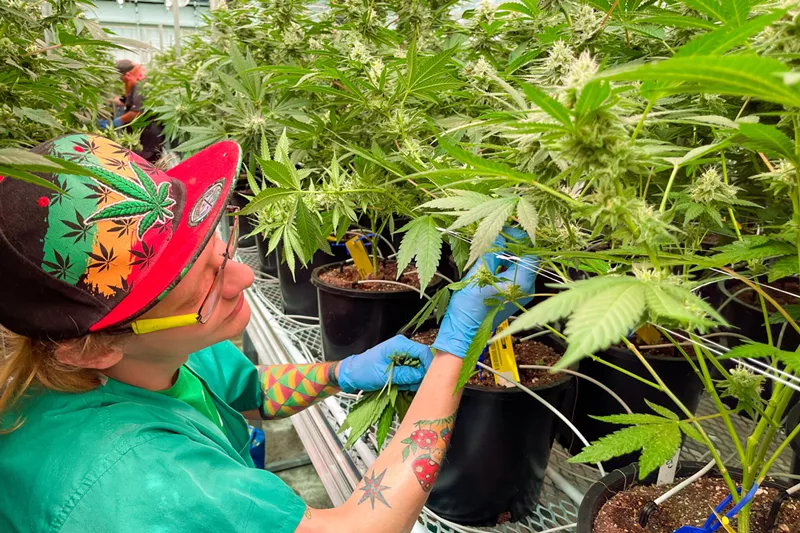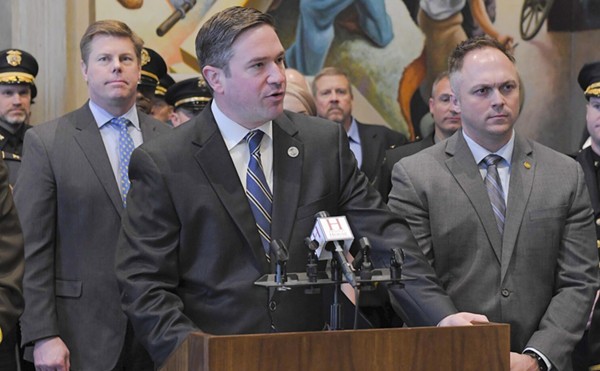
Legal recreational weed quickly became a booming industry in Missouri after adult-use sales began in February. The first day of legalization alone brought in $8 million. By the sixth month, Missouri started to outpace legacy cannabis states such as Washington and Oregon.
As wafts of weed became more prevalent in every corner of Missouri, the state’s counties and smaller local governments started smelling a different kind of green. Money.
In April, voters in dozens of Missouri counties passed a 3 percent county-wide tax on cannabis that stacked on top of the taxes levied by cities. The stacked taxes were immediately problematic as it was unclear if they were legal. Now, two recent lawsuits are challenging just that.
The question comes down to wording in Amendment 3, the constitutional amendment that paved the way for recreational weed. Yet, the reason for the wording becomes clear when you look at how other states have handled their pot industries.
Some states, such as Illinois, have levied exorbitant taxes on marijuana, and their industries have faced setbacks. Just look at Beyond Hello across the river, which has suffered significantly as Missouri stoners opt for home-state dispensaries that are cheaper, even after patronizing Illinois’ dispensaries for years. California and Illinois’ black markets thrive because of the states’ high pot taxes. For Illinois, nearby Michigan’s lower taxes don’t help the state’s market either.
“We’ve seen over and over again from other states that when you tax the sale of cannabis too high, you’re just pushing people to the illicit market,” MoCannTrade spokesman Jack Cardetti says.
So drafters of Amendment 3, now Article 14 of Missouri’s constitution, tried to lay out provisions to prevent high taxes. “Local governments” can add no more than a 3 percent tax on recreational pot in addition to a 6 percent state tax. And though the state’s constitution defines “local government” as “an incorporated area, a village, a town, or city and, in the case of an unincorporated area, a county,” counties are trying to gather a 3 percent tax on recreational sales in incorporated areas.
That means if you bought edibles from a dispensary in Berkeley, an incorporated area in St. Louis County where voters approved a 3 percent tax, you’d have to pay the city’s 3 percent tax on top of the county’s 3 percent and the state’s 6 percent.
If that sounds like a lot, that’s because it is. It’s still less than Illinois, however.
“In most instances, Missouri taxes will still be lower than they are in Illinois, but it definitely cuts into that price advantage,” Cardetti says.
The legality of the new counties’ taxes was supported by the Missouri Department of Revenue, who, in February, walked back guidance it issued earlier that month that said taxes could not be stacked in incorporated areas. The move shocked Missouri’s cannabis industry.
One lawsuit filed by Robust Missouri Dispensary in Florissant, where consumers pay a whopping 14.98 percent tax, asks the court to rule that the constitution does not authorize counties to collect a recreational weed tax in incorporated areas. Greenlight Dispensary in Ferguson filed a similar suit.
Steve Hobbs, executive director of the Missouri Association of Counties, believes Amendment 3’s authors didn’t understand how some cities and counties work here.
“In Missouri, cities reside within the county,” Hobbs says. “After talking with our general counsel, we believe that counties absolutely have the ability to put that on the ballot, and local citizens can decide if they want to tax marijuana or not.”
Legal or not, marijuana would be an easy revenue source for counties. Doug Moore, chief communications officer for St. Louis County, says a tax on recreational marijuana would roughly bring $3 million to the county each year. That money would go to the county’s general fund, according to Moore — and would make a small dent in its $25 million budget deficit.
Hobbs says counties should get tax income because they’ll shoulder the responsibility of “drug treatment programs” that he believes will coincide with the legalization of marijuana. Plus, 3 percent is not the most substantial tax, he says.
“We don’t really have a way to estimate how much that money will be, but I don’t think we’re talking about millions and millions of dollars for any one county,” Hobbs says. “But the simple fact is, most of the treatment issues or social economic programs and the effects that go along with legalizing marijuana are going to be borne by the counties. Most of the drug treatment programs or any of the law enforcement stuff is done by counties.”
It bears pointing out that the marijuana legalization has not been found to increase arrests or place additional burdens on law enforcement, according to the federal Office of Justice Programs.
“We’re standing up for the will of the voters,” Cardetti says. “When Missouri voters passed Amendment 3 last November by a margin of 127,000 votes, they expected a 6 percent state tax and a 3 percent local tax. The counties have gone and done something the voters never anticipated and is absolutely contrary to what’s in the Missouri constitution.”
Follow us: Apple News | Google News | NewsBreak | Reddit | Instagram | Facebook | Twitter | Or sign up for our RSS Feed














